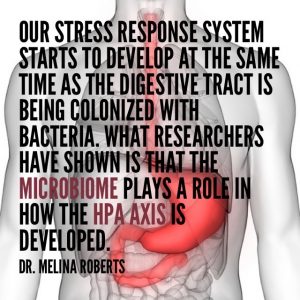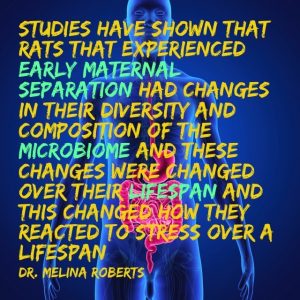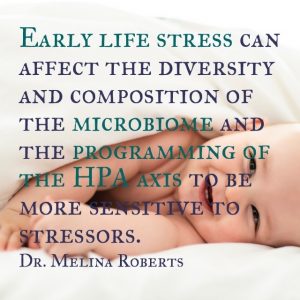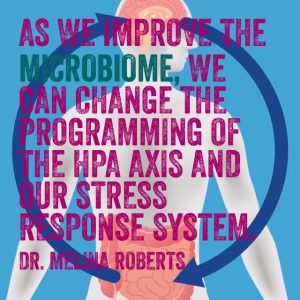What is the connection between stress response system and the early colonization of the microbiome?
This is an interesting connection. As a clinician, I find it interesting to see how different people respond to stress in different ways and this can be explained by the early colonization of the microbiome.
When we are born, we are born with a functional immature stress response system. We have an HPA axis, hypothalamic-pituitary-adrenal axis, which is what controls our body’s stress response. Our stress response system starts to develop at the same time as the digestive tract is being colonized with bacteria. What researchers have shown is that the microbiome plays a role in how the HPA axis is developed.
In a study with rats using maternal separation early in the rats life, this a huge stress on the baby rats to be separated from their mother early in life. This is a huge stress for any baby to be separated from their mother. Those rats that experienced early maternal separation had changes in their diversity and composition of the microbiome and these changes were changed over their lifespan and this changed how they reacted to stress over a lifespan.
Therefore early stress and changes the microbiome and can affect our stress response over a lifespan. That early stress can affect the diversity and composition of the microbiome and the programming of the HPA axis to be more sensitive to stressors.
There is still hope. As we improve the microbiome, we can change the programming of the HPA axis and our stress response system. This demonstrates that huge gut-brain connection.
References:
Foster JA, McVey Neufeld KA. (2013). Gut-brain axis: how the microbiome influences anxiety and depression. Trends in neurosciences, 36(5), 305-312.
Garcia-Rodenas CL et al. (2006). Nutritional approach to restore impaired intestinal barrier function and growth after neonatal stress in rats. J Pediatr Gastroenterol Nutr, 43, 16-24.
O’Mahony SM et al. (2009). Early life stress alters behavior, immunity and microbiota in rats: implications for irritable bowel syndrome and psychiatric illnesses. Bio Psychiatry, 65, 263-267.
Cryan JF, Dinan TG. (2012). Mind-altering microorganisms: the impact of the gut microbiota on brain and behavior. Nat Rev Neurosci. 13; 701-712.




